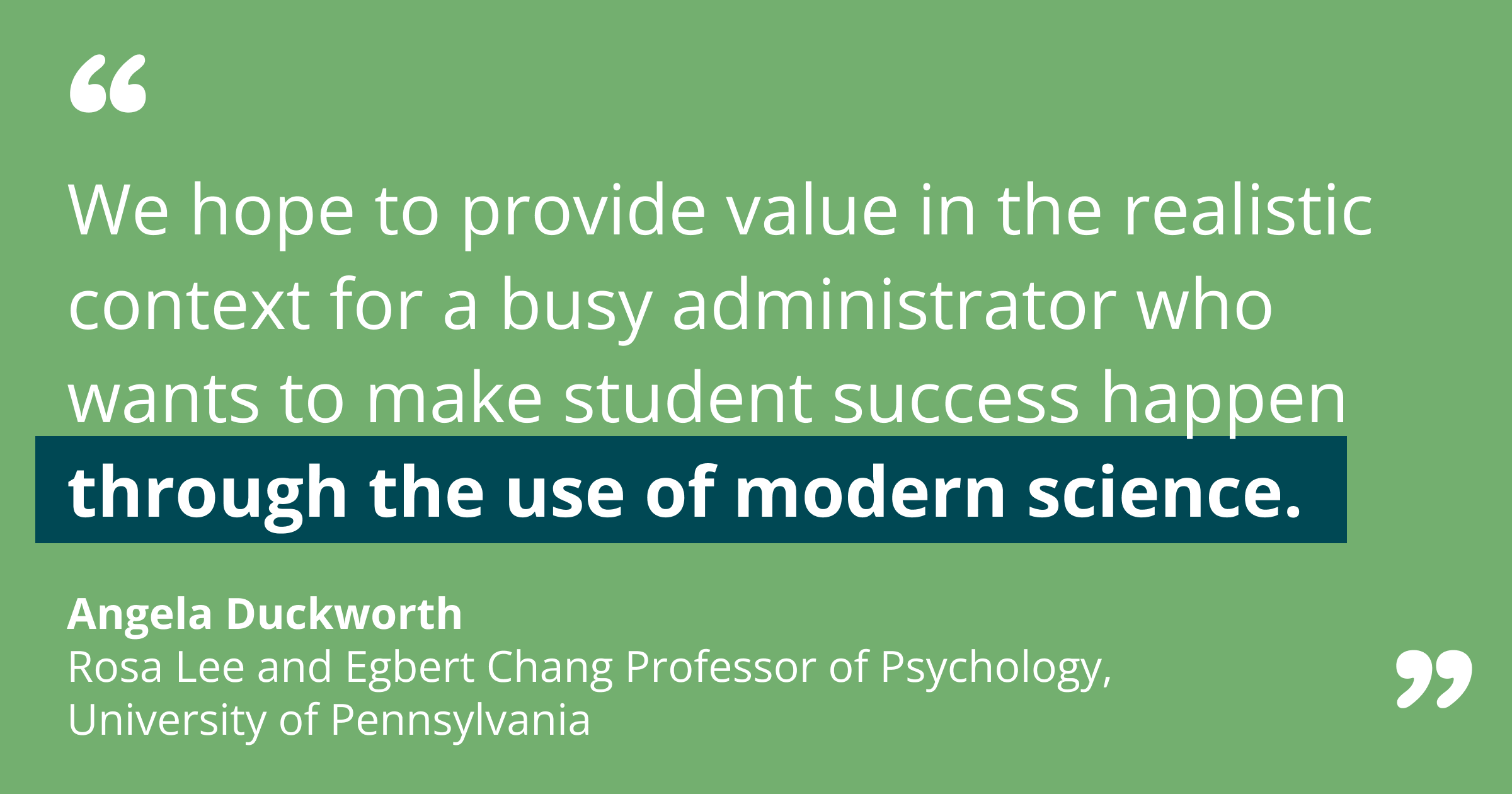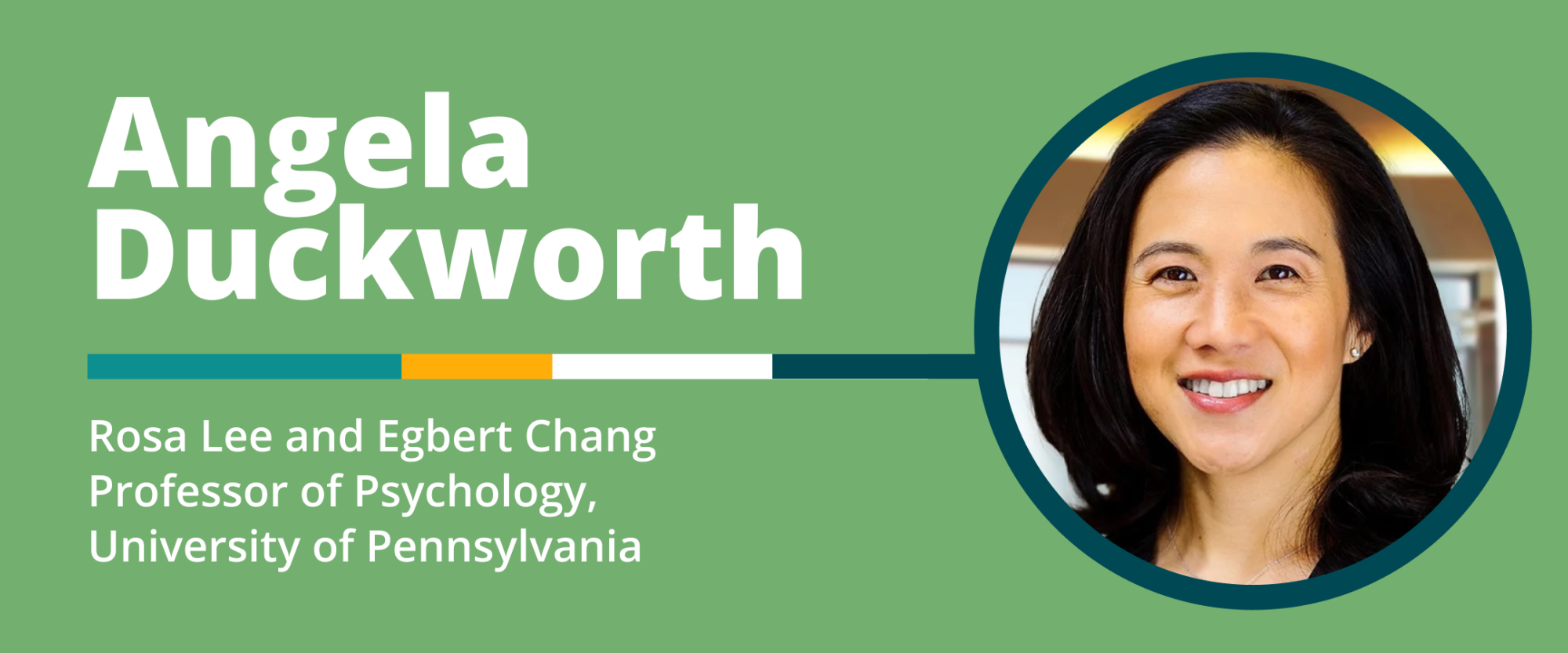The University Innovation Alliance (UIA) is dedicated to surfacing relevant research through the Scholarship to Practice series on the Innovating Together Podcast, providing higher education administrators with actionable insights to enhance student success. For this episode, we sat down with Dr. Angela Duckworth, Professor of Psychology at the University of Pennsylvania to discuss the Behavior Change for Good Initiative. Dr. Duckworth talked about the threshold for institutions that want to join the program, how it can support first-year and transfer students, the best way to present it to administrators, and a perspective on how the resulting data can be used.
Bridging Research and Practice: How Behavioral Science Supports Student Success
Dr. Duckworth is probably best known for her TED talk and her book about grit in education. (The term “grit” refers to the confluence of student motivation and perseverance). As a high school teacher, she wondered why intelligent young people were struggling with the sustained effort required to reach their goals. Observing the supports and obstacles that her students faced led her to study human behavior, earn degrees in neuroscience and psychology, and become a University of Pennsylvania professor. She recognizes student success as a critical issue in higher education, and with fellow Penn-Wharton professor Katherine Milkman, she now focuses on motivationally supporting first-year students as they transition to meeting the expectations and demands of college. The program accomplishes this objective through a series of prompts to help students improve their daily decisions about health, education, and savings.
She described the Behavior Change for Good Initiative’s approach:
“The goal of the student success project is to increase first-year persistence and transcript grades at institutions serving 15,000 undergraduates or more with graduation rates under 85%. Those large institutions serve students who are not always succeeding. That's who our collaborating partners are. We're matching these institutions with behavioral scientists who are concocting programs to help students make the transition from high school to the first year. We've recruited scientists at the bleeding edge of how to support students in that transition, scientists who study belonging, identity and affirming your values as psychological supports, or self-control and time management. If you partner with us, that enables us to evaluate which of these approaches help which students the most when we engage them in our activities during the transition to college and in the first semester. It's very light touch, just one website link that the school sends out to the undergraduates. They get a digital activity as an introduction, and they get supportive text messaging throughout the fall. And we are hoping that those psychologically wise interventions will help us see the needle move on both persistence and grades through the first year.”
How Colleges Can Use Behavioral Science to Support First-Year and Transfer Students
At the UIA, we’ve long been aware that first-year students, in addition to facing new academic demands, are more likely to struggle with the transition to campus life after the comfortable structures of high school and living at home. This can also be the case with transfer students, who might lose momentum while adjusting to a new environment. Dr. Duckworth explained how the Behavior Change for Good Initiative can be scaled to different institutions and help all students feel that they belong where they are:
“For any university who partners with us, they get all of the interventions that are being developed. Then we are able to tell them at the end of the study, ‘Here are your data. Here's what worked best for you. Also, as part of this consortium, here's what worked best on average.’ With all the data on their own school, they can see how each intervention played out and compare it to the broader consortium. By not tailoring the approaches very specifically by school, that enables us to make an apples-to-apples comparison across schools. Not customizing is in some ways a design constraint of the study. But I think schools need to realize that once you have an insight about what needs to be supported psychologically on that campus, then you can say, ‘Oh, this is what works. Now I figure out how I can build that into the DNA of our first-year experience program or our other supports for students.’”
Three Steps to Implement the Behavior Change for Good Initiative at Your Institution
Dr. Duckworth offered some recommendations to leaders interested in pitching this program to their administration:
“The first ask is that first-year students would get our website link during their orientation process. That link is the portal to the rest of the intervention, and then we'll handle all the text messaging from there. The second ask is that you would help us navigate your school’s institutional review board so that we can get approval to involve students in the program. And the third ask is to provide the outcome data at the end of the school year to verify the enrollment status and the grades for the students who participated in the intervention.”
She went on to detail how the two dozen participating universities are benefitting from the study:
“You will get the actual programming. The scientists working on these supports are all contributing their effort and intellectual capital pro bono. You’ll also get insights about the programming that worked best on your campus and then in total for the entire consortium. Many schools are interested in different subgroups, such as whether they’re including Peer Advising Leadership recipients or students from first-year backgrounds. And we will analyze that data to determine what works best for whom."

Why Higher Ed Administrators Should Consider This Evidence-Based Student Success Program
Dr. Duckworth recognizes that higher ed administrators already have so many demands on their time and attention that they may be reluctant to participate in yet another study or stand up yet another program. She assured them:
“We really have piloted and iterated on this program for three years to make it as light a lift as possible with the greatest bang for the buck. And honestly, I would love to work with universities who share our passion for the next frontier. What can we do that augments the things that we already have in place for our first-year students? We're going to look at what works and what doesn't work with clear-eyed objectivism. When the data come back, we'll be honest and complete. We are hoping to provide value in the realistic context of a very, very busy administrator's life who cares about student success, wants to make it happen through the use of modern science, but honestly is not going to do the kind of legwork that the scientific team is doing."
Note: This interview in the Scholarship to Practice Series originally aired on January 20, 2025 as part of the University Innovation Alliance’s Innovating Together Podcast, appearing live on YouTube, Facebook, Twitter, and LinkedIn.
Resources Mentioned in This Episode
- Dr. Angela Duckworth: Professor of Psychology at the University of Pennsylvania
- Angela Duckworth's TED talk: “Grit: The Power of Passion and Perseverance”
- Angela Duckworth's book: Grit: The Power of Passion and Perseverance
- The Behavior Change for Good Initiative: a study and motivational system that helps first-year and transfer students improve daily decisions about health, education, and savings
Bios of Guest and Co-Host

Dr. Angela Duckworth is the Rosa Lee and Egbert Chang Professor at the University of Pennsylvania and faculty co-director of the Penn Wharton Behavior Change for Good Initiative. A 2013 MacArthur Fellow, she has advised the World Bank, NBA and NFL teams, and Fortune 500 CEOs. Prior to her career in research, Dr. Duckworth founded a summer school for underserved children that was profiled as a Harvard Kennedy School case study and, in 2018, celebrated its 25th anniversary. She has also been a McKinsey management consultant and a math and science teacher at public schools in New York City, San Francisco, and Philadelphia. She co-founded Character Lab, a nonprofit dedicated to advancing scientific insights that help children thrive. Angela completed her undergraduate degree in Advanced Studies Neurobiology at Harvard, her MSc with Distinction in Neuroscience from Oxford University, and her PhD in Psychology as a National Science Foundation Graduate Fellow at the University of Pennsylvania. Her TED talk is among the most viewed of all time. Her book Grit: The Power of Passion and Perseverance is a #1 New York Times best seller.

Co-Host: Bridget Burns, Executive Director, University Innovation Alliance
Dr. Bridget Burns is the founding Executive Director of the University Innovation Alliance (UIA). For the past decade, she has advised university presidents, system chancellors, and state and federal policy leaders on strategies to expand access to higher education, address costs, and promote completion for students of all backgrounds. The UIA was developed during Bridget’s tenure as an American Council on Education (ACE) Fellowship at Arizona State University. She held multiple roles within the Oregon University System, including serving as Chief of Staff and Senior Policy Advisor, where she won the national award for innovation in higher education government relations. She was a National Associate for the National Center for Public Policy and Higher Education, and has served on several statewide governing boards including ones governing higher education institutions, financial aid policy, and policy areas impacting children and families.
About Weekly Wisdom
Weekly Wisdom is an event series that happens live on Facebook, Twitter, and LinkedIn. It also becomes a podcast episode. Every week, we join forces with Inside Higher Ed and talk with a sitting college president or chancellor about how they're specifically navigating the challenges of this moment. These conversations will be filled with practicable things you can do right now by unpacking how and why college leaders are making decisions within higher education. Hopefully, these episodes will also leave you with a sense of optimism and a bit of inspiration.
Rate, Review & Subscribe
Learn why hundreds of people have rated this new podcast 5 stars! Please join others and rate and review this podcast. This helps us reach and inform more people -- like you -- to help increase the number and diversity of college graduates in the United States.
Click here, scroll to the bottom, tap to rate with five stars, and select “Write a Review.” Then be sure to let us know what you loved most about the episode! Also, if you haven’t done so already, subscribe to the podcast. We’ll be adding a bunch of bonus episodes to the feed and, if you’re not subscribed, there’s a good chance you’ll miss out.

